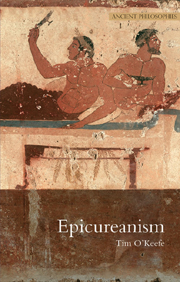Book contents
- Frontmatter
- Contents
- Preface
- Acknowledgements
- Sources and abbreviations
- Chronology
- 1 Introduction: the life of Epicurus and the history of Epicureanism
- I Metaphysics and physics: introduction and overview
- II Epistemology: introduction and overview
- III Ethics: introduction and overview
- 11 Pleasure, the highest good
- 12 Varieties of pleasure, varieties of desire
- 13 The virtues and philosophy
- 14 Justice
- 15 Friendship
- 16 The gods
- 17 Death
- Glossary of terms
- Notes
- Further reading
- Bibliography
- Index
11 - Pleasure, the highest good
from III - Ethics: introduction and overview
- Frontmatter
- Contents
- Preface
- Acknowledgements
- Sources and abbreviations
- Chronology
- 1 Introduction: the life of Epicurus and the history of Epicureanism
- I Metaphysics and physics: introduction and overview
- II Epistemology: introduction and overview
- III Ethics: introduction and overview
- 11 Pleasure, the highest good
- 12 Varieties of pleasure, varieties of desire
- 13 The virtues and philosophy
- 14 Justice
- 15 Friendship
- 16 The gods
- 17 Death
- Glossary of terms
- Notes
- Further reading
- Bibliography
- Index
Summary
Teleological ethics in a non-teleological world
Epicurus' ethics operates within the framework articulated by Aristotle, a framework that systematizes the ethical thinking of Aristotle's predecessors and was accepted by almost all later Greek philosophers. The central question of ethics is: what is the highest good? The good of something is its telos, its goal or purpose. This teleological analysis of the good extends quite widely; we can ask what the good is, not only of human life, but also of actions, artefacts, crafts such as medicine and so on. And in each case, we discover the item's good by discovering its goal or purpose.
But some goods are instrumental goods, that is, goods desired for the sake of some further good. I may go to the medicine cabinet in order to take some nasty cherry-flavoured cough syrup. So taking the cough syrup is the goal, and the good, of that action. But the nasty cough syrup is not desired for its own sake; instead, I pursue it in order to quell my awful hacking. Aristotle says that the highest good must be an intrinsic good and not an instrumental good: something that is desired only for its own sake and not for the sake of something else.
Aristotle believes that there are a multiplicity of intrinsic goods, such as pleasure, honour, virtue and friendship, each of which is worth pursuing for its own sake even if no other benefit results. However, each of them is pursued also because we think that by obtaining them we will help make our lives happy, and we do not pursue happiness for the sake of something else.
- Type
- Chapter
- Information
- Epicureanism , pp. 111 - 116Publisher: Acumen PublishingPrint publication year: 2009



